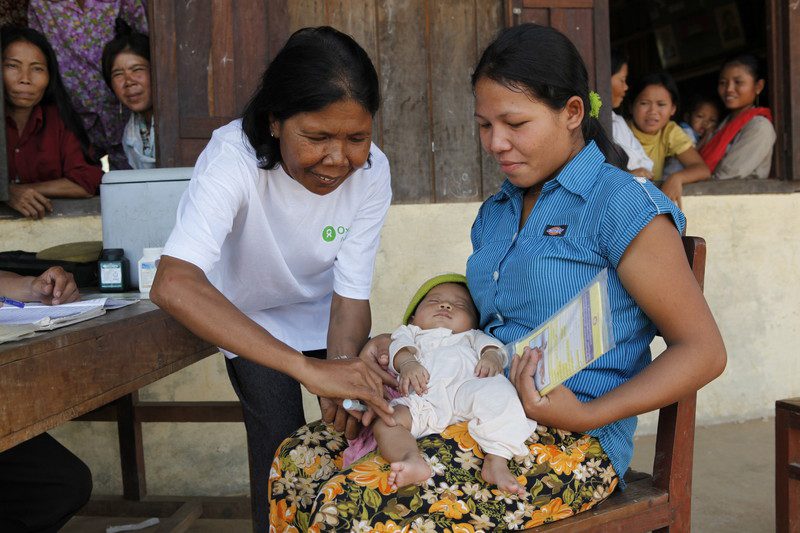Essential services: learnings and progress
People living in poverty, especially women and girls, will have accessible and affordable healthcare, water, sanitation and education.
Our progress to date against the strategic plan
Mid-term review finding: good progress
We have effectively supported the delivery of essential services that reach vulnerable and marginalised groups and address issues of inequity and diversity in innovative ways. Although we have tried to build the capacity of government agencies and other service providers, we need to do more to empower citizens to hold governments and others to account for the provision of adequate, appropriate and equitable essential services.
Read more about our progress in our economic justice goal in our mid-term review.
Reflecting on our work
The scope and geographic focus of work in essential services has not changed significantly in the past four years.
Southern Africa and Australia are still the main areas of campaign work, while thematically, water, sanitation and hygiene (WASH) work, Aboriginal and Torres Strait Islander health, and HIV and AIDS, remain the key programmatic areas. This is not a bad thing; WASH has grown considerably in the past two years, and gender has demonstrably been targeted within all three thematic areas.
This shows a successful combination of strategic and organic growth — growth targeted for particular areas, building on what the agency does well and resulting in measurable progress towards the attainment of essential services for those living in poverty. Our new areas of concerted activity are in domestic resource mobilisation (generation of savings from domestic resources and their allocation to socially productive investments) and consolidating work on holding governments to account.
The integration of advocacy and long-term development work is starting to produce tangible outcomes, most notably in Aboriginal and Torres Strait Islander health, and we have also prioritised building our partners’ capacity in water, sanitation and hygiene work.
Our strengths have been in supporting the delivery of essential services that reach and are suited to vulnerable and marginalised groups, and address issues of inequity and diversity in innovative ways. However, we need to articulate more clearly how our work reflects progress towards the Millennium Development Goals.
We have also had several cases of working successfully with partners and communities to hold governments to account and, in some circumstances, secure additional funding. We are currently undertaking research on different service-provision models, and their effectiveness in holding governments to account, to identify the most effective methods.
Themes of our work in essential services over the past four years are:
- Water, sanitation and hygiene work: our water, sanitation and hygiene (WASH) work has become more prominent over the course of the plan period. We have built our organisational capacity for WASH programs and are demonstrating credibility and expertise in this area. This has culminated in the design and implementation of a portfolio of projects in six countries, funded via an AusAID grant.
- Holding governments to account: we have taken diverse and effective approaches to support communities and local groups to hold their governments to account for good quality services. In some cases this has resulted in ongoing funding and in others, mechanisms for dialogue between communities and government service providers. For example, the inception of the Close the Gap campaign and its success in invoking change on Aboriginal and Torres Strait Islander health at the state and federal government levels; supporting and promoting citizens to demand services through initiatives such as radio-listening clubs in Malawi and the Cope for Life program in Timor-Leste
- Incorporating gender across our work: good gender analysis has been demonstrated across the agency through shelter work in Sri Lanka; HIV programs in South Africa, Vanuatu, and the Solomon Islands; and programs working with men in South Africa, Zimbabwe and Indigenous Australia
- A holistic approach to HIV and AIDS: our holistic work with people living with and affected by HIV and AIDS in Southern Africa recognises the integrated nature of vulnerability and is successfully addressing multiple issues impacting upon the lives of marginalised groups, such as livelihoods, discrimination, health, rights, food security and education
What we’ve learned
- The areas of our essential services work that are tracking well — water, sanitation and hygiene, Aboriginal and Torres Strait Islander health, and HIV and AIDS — have much in common: they have relied on strong partnerships which work best when they are committed, flexible, respectful and financially sustainable
- We need to be clear about our strengths in providing services and how we add value to existing services and service providers. We must be mindful that our work is sustainable and that we are not assuming the responsibility of governments
- Our water, health and sanitation framework provides a solid foundation for program design and is an approach that can be used for other programs and by other agencies
- In long?standing programs, such as our HIV and AIDS programs and Aboriginal and Torres Strait Islander health programs, many partnerships are transitioning from dependency, to support, to independence. Strong relationships allow us to play an enabling and supporting role with partners — with initial attention on getting the basics in place and subsequent focus on the more sophisticated aspects of their work, including measuring impact.
- Our water, sanitation and hygiene programs in Timor-Leste and Papua New Guinea have had issues with partner capacity, resulting in a revision of program goals. It would be useful to undertake a linking and learning project to consider why these have been less successful than similar programs in Mozamique, Cambodia, Bangladesh and Zambia
Read an overview of this key goal, and what we’re doing to achieve it.
